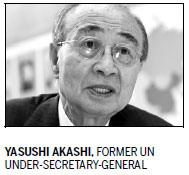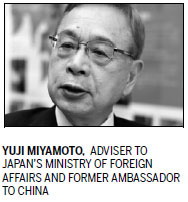Editor's note: China Daily and Japan's Genron NPO think tank co-hosted a preparatory meeting on Sunday in Beijing for the 10th Beijing-Tokyo Forum, an annual event which is expected to take place in late September. China Daily talked to six prominent figures at the meeting for their insights on the Sino-Japanese relationship.
Q1: What are your evaluations and expectations of the 10-year-old Beijing-Tokyo Forum?
Q2: What are the deeper causes of the current tension and are there any differences from previous strains in ties?
Q3: What may lead to a breakthrough?
Q4: How do you see relationship in the near future (2014 to 2016)?

A1 I am convinced that in the end, the good sense of the people of the two countries will prevail, and this forum has played, and still plays, a very important role in bridging the gaps.
A2 The media sometimes oversimplify (the relationship)...Japan made a lot of mistakes in the past by branding some nations.
A3 Countries in Asia have to adjust to each other. And that takes time. Problems tend to be exacerbated, especially territorial issues, or issues of history.
A4 Inevitably, Japan will try to buy more things from China, and more Japanese businessmen may want to invest in China. China is becoming more wealthy, so more Chinese are willing to travel to Japan.

A1 With 10 years of forum dialogue, a strong trust has been built among the attendees through face-to-face interactions and communications.
A2 The strategic order in the East Asia has changed. The Japan-China relationship now should be examined in a trilateral context rather than a bilateral one, giving due consideration to the influence of the United States.
A3 A successful political settlement requires "techniques in diplomacy", and a final scenario involving a total loss by either side should be avoided.
A4 Both countries and the relationship are undergoing transitional situations, and we should not take the status quo as something permanent.